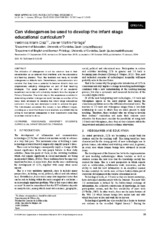Mostrar el registro sencillo del ítem
Can videogames be used to develop the infant stage educational curriculum?
| dc.contributor.author | Martín-Párraga, Javier | |
| dc.contributor.author | Marín-Díaz, Verónica | |
| dc.date.accessioned | 2014-02-27T09:27:45Z | |
| dc.date.available | 2014-02-27T09:27:45Z | |
| dc.date.issued | 2014 | |
| dc.identifier.uri | http://hdl.handle.net/10396/11860 | |
| dc.description.abstract | The utilization of videogames is not too common due to their consideration as an element that interferes with the educational and learning process. Thus, few teachers are ready to include videogames as didactic tools. Nevertheless, some educators who consider that they have a potential to become didactic tools are progressively adopting videogames as part of their teaching strategies. This paper presents the result of an academic experiment conducted with university students from the degree of Primary Education. The initial step in this experience consisted in determining whether videogames could be seen as another of the many tools employed to develop the infant stage educational curriculum. A survey was developed in order to achieve this goal. The interviewees answered this survey in two different stages, providing as a result that these future teachers would definitely be willing to incorporate videogames in their classrooms once they have been trained to do so. | es_ES |
| dc.format.mimetype | application/pdf | es_ES |
| dc.language.iso | eng | es_ES |
| dc.publisher | Universidad de Alicante | es_ES |
| dc.rights | https://creativecommons.org/licenses/by-nc-nd/4.0/ | es_ES |
| dc.source | NAER New Approaches in Educational Research 3 (1), 20-25 (2014) | es_ES |
| dc.subject | Videogames | es_ES |
| dc.subject | University students | es_ES |
| dc.subject | Curriculum | es_ES |
| dc.subject | Infant education | es_ES |
| dc.subject | Training | es_ES |
| dc.title | Can videogames be used to develop the infant stage educational curriculum? | es_ES |
| dc.type | info:eu-repo/semantics/article | es_ES |
| dc.rights.accessRights | info:eu-repo/semantics/openAccess | es_ES |

